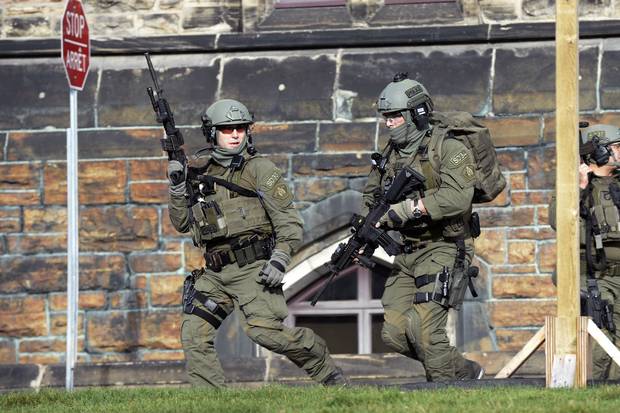The 9/11 attacks forced a retrenchment in the West when traditional methods of waging war proved inadequate against ill-defined, nonstate terrorist groups abroad who don’t fight by the normal rules. Well, it’s time to retrench again.
The new enemy isn’t plotting big missions from training camps in distant countries like Afghanistan or Syria. He or she may be right here among us, perhaps having attended high school with our children or working down the road. The Islamic State is calling on them to attack anywhere, anytime, by whatever means.
Two attacks this week in Ottawa underscore the changing threat. Michael Zehaf-Bibeau, 32, shot and killed a Canadian soldier at a war memorial Wednesday, then opened fire inside the nearby Parliament building as legislators met. Zehaf-Bibeau was killed in a hail of gunfire. He was a recent, radicalized convert to Islam.
On Monday, Martin Couture-Rouleau, 25, plowed his car into two soldiers walking outside a government building, killing one of them. He also had grown radicalized after converting to Islam last year.
Both are known to have followed Islamic State messages online, possibly including one in September urging attacks on Canadian and other Western "disbelievers." "Smash his head with a rock, or slaughter him with a knife, or run him over with your car, or throw him down from a high place, or choke him, or poison him," it said.
Then there’s the bizarre story of three Denver-area girls — Americans of Somali and Sudanese descent — who skipped high school and flew to Europe last weekend with plans to join the Islamic State.
These are the types who would bring the war front to the West’s doorstep. Tighter borders and police-state tactics won’t keep them out; they’re already here.
Local police and federal intelligence agencies can, however, escalate efforts to divert homegrown jihadists before they strike. Years ago, the federal government established a network of “fusion centers” designed to help law enforcers develop networks of citizen informers. If anyone is better equipped to recognize and report radicals in their midst, it’s the Muslims who socialize and attend mosque with them.
“Most of this intelligence comes from the Muslim community,” Mubin Shaikh, a former jihadist and counterintelligence operative, told CNN. He said a jihadist plot last year to attack passenger trains in Canada was foiled by intelligence supplied by a watchful imam.
The idea isn’t for Muslims to spy on one another or choose between their religion and their country. The vast majority are horrified by Islamic State violence and, we suspect, would gladly work to prevent its spread in North America.
If they recognize radicals in their midst who are distorting Islamic ideals, now’s the time to alert authorities — before they go off the deep end.
WHAT THEY SAID: The threat at home
“Smash his head with a rock, or slaughter him with a knife, or run him over with your car, or throw him down from a high place, or choke him, or poison him.” — Online message in September from the Islamic State urging attacks on “disbelievers” in Canada, Europe and the U.S., in response to coalition attacks in Syria and Iraq
“In the overwhelming number of cases, especially with converts, they come from very broken backgrounds, dysfunctional backgrounds. … Most of this intelligence [to identify radicals] comes from the Muslim community.” — Mubin Shaikh, former jihadist turned counterintelligence operative, speaking to CNN on Thursday
















